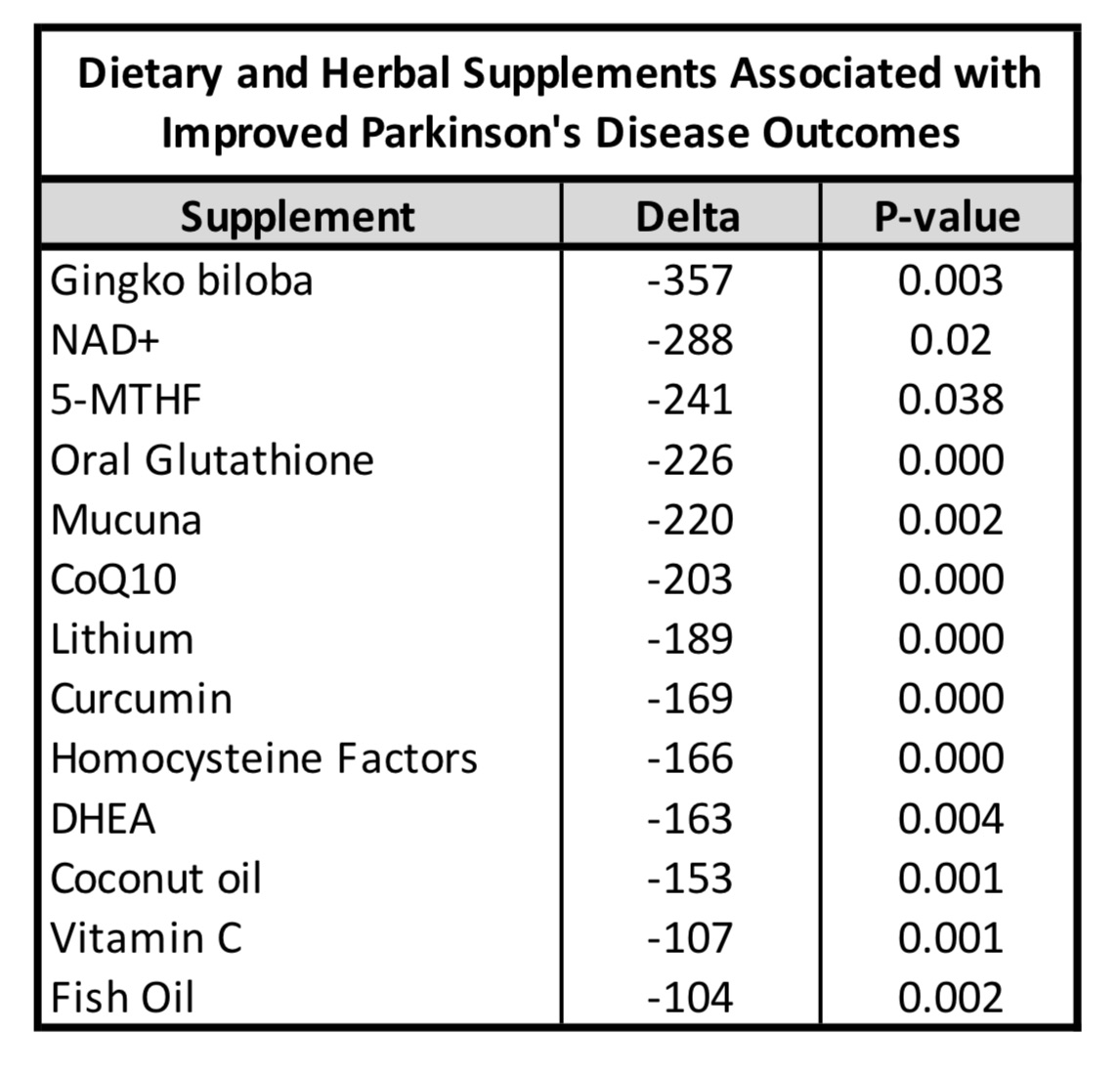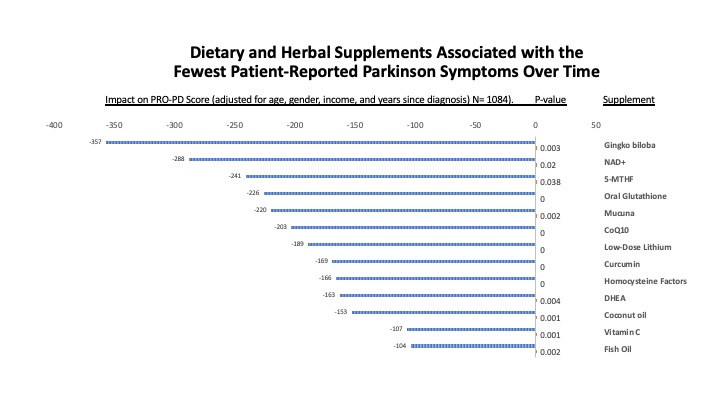Category: Epidemiology
Objective: The goal of this study was to evaluate whether the use of nutraceuticals and dietary supplements are associated, on a population level, with Parkinson’s disease (PD) outcomes over time.
Background: There is a growing body of evidence suggesting dietary and herbal supplements may modulate key factors and pathways associated with PD pathophysiology.(1, 2) A 2015 survey among people with PD revealed that vitamins were used by 66% of survey respondents, the most commonly employed complementary and alternative intervention.(3) To date, little research has been done to evaluate safety, costs, side effects, or effectiveness of PD-specific nutraceuticals, information desired by patients, providers, and industry.
Method: Data from the internet-based, ongoing natural history study, Modifiable Variables in Parkinsonism (MVP) were used for this analysis. This cross-sectional analysis was restricted to individuals reporting a diagnosis of idiopathic PD and 2021 responses only. Participants were asked to categorically check the box for any supplement that they have taken consistently over the prior 6 months. The Patient-Reported Outcomes in PD (PRO-PD) was used as the primary outcome measure.(4) All regression analyses were adjusted for age, gender, income, and years since diagnosis as previously described.(5)
Results: A total of 1084 individuals with PD were available for this analysis. Individuals reporting consistent use of the following supplements also reported fewer PD symptoms: Gingko biloba, NAD+, 5-methyltetrahydrofolate, glutathione, mucuna, coenzyme Q-10, low-dose lithium, curcumin/ turmeric, homocysteine-lowering B-vitamin complex, DHEA, coconut oi, vitamin C, and fish oil (all p < 0.05). (Table 1, Figure 1)
Conclusion: Results from this natural history study suggest the use of over-the-counter nutraceuticals may have therapeutic benefit. The supplements on this list with the greatest perceived impact on a population level and for which there is biologically plausible rationale for their use in PD should be considered for evaluation in prospective intervention studies.
References: 1. Onaolapo OJ, Odeniyi AO, Onaolapo AY. Parkinson’s Disease: Is there a Role for Dietary and Herbal Supplements? CNS Neurol Disord Drug Targets. 2021;20(4):343-365. doi: 10.2174/1871527320666210218082954. PMID: 33602107.
2. Ciulla M, Marinelli L, Cacciatore I, Stefano AD. Role of Dietary Supplements in the Management of Parkinson’s Disease. Biomolecules. 2019 Jul 10;9(7):271. doi: 10.3390/biom9070271. PMID: 31295842; PMCID: PMC6681233.
3. Finseth TA, Hedeman JL, Brown RP 2nd, Johnson KI, Binder MS, Kluger BM. Self-reported efficacy of cannabis and other complementary medicine modalities by Parkinson’s disease patients in colorado. Evid Based Complement Alternat Med. 2015;2015:874849. doi: 10.1155/2015/874849. Epub 2015 Mar 2. PMID: 25821504; PMCID: PMC4363882.
4. Mischley LK, Lau RC, Weiss NS. Use of a self-rating scale of the nature and severity of symptoms in Parkinson’s Disease (PRO-PD): Correlation with quality of life and existing scales of disease severity. NPJ Parkinsons Dis. 2017 Jun 16;3:20. doi: 10.1038/s41531-017-0021-5. PMID: 28649620; PMCID: PMC5473828.
5. Mischley LK, Lau RC, Bennett RD. Role of Diet and Nutritional Supplements in Parkinson’s Disease Progression. Oxid Med Cell Longev. 2017;2017:6405278. doi: 10.1155/2017/6405278. Epub 2017 Sep 10. PMID: 29081890; PMCID: PMC5610862.
To cite this abstract in AMA style:
L. Mischley, J. Farahnik. Association Between Over-the-Counter Dietary Supplements and Parkinson’s Disease Symptom Severity Over Time [abstract]. Mov Disord. 2022; 37 (suppl 2). https://www.mdsabstracts.org/abstract/association-between-over-the-counter-dietary-supplements-and-parkinsons-disease-symptom-severity-over-time/. Accessed December 28, 2025.« Back to 2022 International Congress
MDS Abstracts - https://www.mdsabstracts.org/abstract/association-between-over-the-counter-dietary-supplements-and-parkinsons-disease-symptom-severity-over-time/


